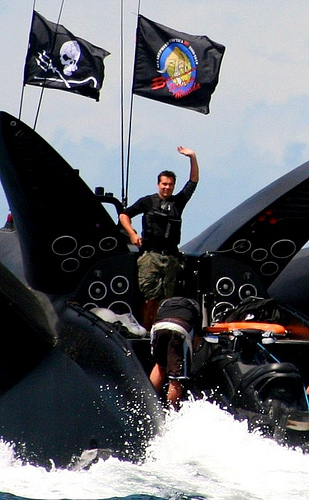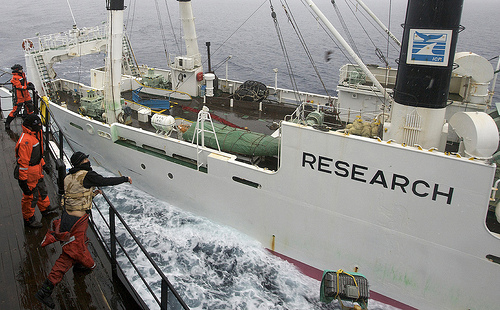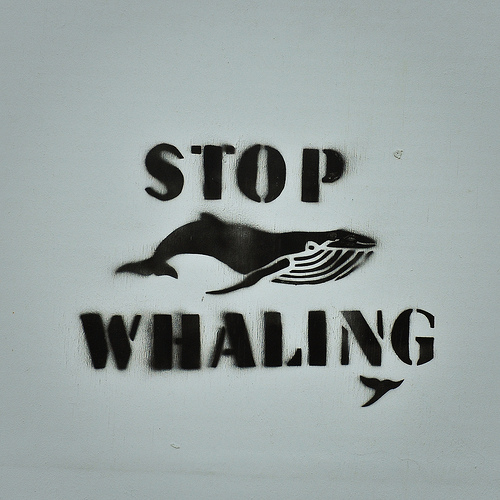Only a few days after “The Cove” was awarded the Oscar as best documentary drawing the attention of public and media around the world to the hunting of cetaceans issue, anti-whaling group Sea Shepherd’s leader Peter Bethune was arrested in Tokyo [en], re-igniting the controversy between Japan and Australia – New Zealand.
The protest group activist is charged with trespassing, for boarding a Japanese whaling ship in the Southern ocean during February while attempting to make a citizen’s arrest of its captain for the sinking of the Sea Shepherd’s ship one month earlier (as previously reported for Global Voices by Kevin Rennie).
Although Japan’s whaling program is only authorised for scientific purposes and most of the Japanese people do not regard whale meat their favourite meal, the collision with the New Zealand anti-whaling vessel has roused some sentiment of nationalism [ja], though weak, in the country.
But ‘jingoistic’ sentiments are also evident in the announcement of Peter Bethune’s arrest on the Sea Shepherd official website.
The Japanese whaling ship Shonan Maru 2 arrived in Tokyo today with the first New Zealand prisoner of war to be transported to Japan as a political prisoner since World War II.As soon as his foot touched Japanese soil, Captain Bethune reestablished himself as a national hero in New Zealand and an international hero in Australia, France, Britain, the United States, and every other country whose citizens deplore the continued illegal whaling activities of the Japanese whaling fleet.
In Japan, some feel New Zealand and Australia’s anti-whaling activity as an attack on their country’s food culture and wonder why whale meat should be prohibited while cattle and pig meat is not[ja]. It highlights the contentious divide between slaughtering debatably intelligent versus non intelligent animals.
In some cases Japanese media increasingly rode the wave of polemic on the issue. James at Japan Probe posts about Japanese broadcaster NTV’s show ‘Bankisha’ reporting on the Sea Shepherd issue. In the first part of the show he says, attention is paid to analyzing Sea Shepherd’s funding sources and budget.
The second half of the clip is about Sea Shepherd’s next target: the bluefin tuna fishing in the Mediterranean. It looks like many countries have teamed up to ban the fishing of the species, and since 80% of the catch is sold on the Japanese market, it is being interpreted as yet another attack on Japan’s cultural traditions.
Joining the reporters in the studio are an art director who does marketing for many of Japan’s famous brands and a legal scholar. The legal scholar points out how America used to kill whales for oil. He also thinks the American position towards Japanese whaling is influenced by an underlying hostility that the “white world” [白人社会] feels towards Japanese. The art director thinks that Japan needs to do a better job at presenting its case to the world, as so many people in other countries don’t understand why Japanese people eat whale meat.
Masablog however does not agree with those who use food culture as a counter-argument deeming it as reductive.
何となく日本たたきのようにこの問題をとらえていたが、ちょっと違うみたいだなあ。
日本人の反論としてよくあるものに、じゃあアメリカ人は牛を食べるが、それと何が違うんだ?鯨を助けても牛の数が減るだけだ、というものがある。これに対しては、単に鯨は知能が高いからかわいそうだということではなく、殺すのに時間がかかるので人道的に問題があるという議論があるようだ。
As counter-argument, some Japanese wonder what the difference is between Americans eating beef [and Japanese eating whale]. Another one is that even if whales are protected, it’ll simply cause the number of cows to decrease. However, the real discussion seems to be humanitarian, regarding the fact that it takes more time to kill a whale. The issue is not about people being empathic with whales because of their high intellectual ability.
Akki says he condemns the methods used by the animalist group.
私自身は捕鯨については賛成も否定もしませんが
(いまどきの高価な鯨を食べるようなお金もないですし)
彼らのやり方は、どう理由があろうがはなはだ迷惑な行為であり
危険であります。本当にケガ人が出たらどうするつもりなんだろう。
Australian blogger Youngmarxist calls for an accurate revision of the IWC rules that would regulate whaling at international levels.
Reports are hitting the media about draft amendments to international whaling rules that are meant to bring Japan, and other whaling nations, back under the rule of the International Whaling Commission. The amendments in effect will allow nations that are already killing whales to keep on doing so with the approval of the IWC, provided that they limit the numbers of whales they catch. The exact limits are yet to be decided, and of course will only apply if the draft amendments pass.[…]
If this plan ends the ridiculous hypocrisy that is “scientific” whaling, so much the better. There is no reason that whales should be treated any differently to any other resource. Whales should be managed properly, so they aren’t recklessly driven extinct, but there’s no good moral reason to privilege the “rights” of whales over the right of humans to hunt them.










6 comments
“the contentious divide between slaughtering debatably intelligent versus non intelligent animals”
The problem is not so much that it is okay to eat dumb animals and not okay to eat smart ones (and pigs ARE really smart). That would lead in philosophically murky waters.
Hunting animals to the brink of their extinction is not okay, and internationally sanctioned hypocrisy of “scientific” whaling isn’t okay either.
If anyone has seen the show “Whale Wars” the anti-whaling group Sea Shepherd’s is featured in it. It is a great way to see what these people go through to protect whales. Personaly i disagree with whaling because of the methods. However there is a market for whale meat and money unfortunitly has a huge contribution to the deaths of these whales.